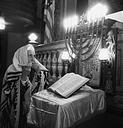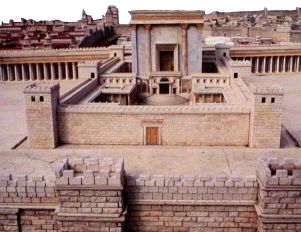|
The Day of Atonement (Yom Kippur) falls this year
on September 16. This is the most holy of all the Holy Days that God
commanded Israel to keep. Celebrating this Holy Day entails
keeping a fast from sunset the day before (September 15 to the next sunset
of September 16), as a new day is observed from sunset to sunset.
The reason for fasting is in order for
people to take 24 hours of constant prayer and dedication to God.
Yom Kippur is a Holy Day that is considered a shabbat, a day of rest, in
which no work is to be done.
Leviticus 23:27
Howbeit on the tenth day of this seventh month is the day of atonement; there shall be a holy convocation unto you, and ye shall afflict your souls; and ye shall bring an offering made by fire unto YHVH.
Leviticus 23:28
And ye shall do no manner of work in that same day; for it is a day of atonement, to make atonement for you before YHVH your God.
Leviticus 23:29
For whatsoever soul it be that shall not be afflicted in that same day, he shall be cut off from his people.
Leviticus 23:30
And whatsoever soul it be that doeth any manner of work in that same day, that soul will I destroy from among his people.
Leviticus 23:31
Ye shall do no manner of work; it is a statute FOR EVER throughout your generations in all your dwellings.
Leviticus 23:32
It shall be unto you a Sabbath of solemn rest, and ye shall afflict your souls; in the ninth day of the month at even, from even unto even, shall ye keep your Sabbath.
This Holy Day follows the 10 days of awe after the
Feast of Trumpets (Rosh Hashannah or Yom Teruah). In these 10 days,
people are supposed to prepare for Yom Kippur by asking other people for
forgiveness of any wrongdoings they did to them.
We must understand that in Hebrew asking
for forgiveness is different from saying "I'm sorry." To
ask for forgiveness means you go to the person you did wrong to, and ask
him to forgive you, and you show with your actions that you mean what you
say. You will also need to make restitution for the wrong.
That places the authority in the hands of the person you wronged, who will
then decide if he wishes to forgive you.
A process
starts in which the person looks at your actions and whether you try to
make restitution for your wrongdoing. If he sees that you have tried
to make good, he might come later on, maybe a few days or weeks, and
forgive you.
When the day of atonement (Yom Kippur)
arrives, we have made all the effort we can in asking other people for
forgiveness and now we are "in the presence of the Lord" and
show Him our repentance and ask for forgiveness from not keeping His
commandments.
In Hebrew the word used for repentance
is "shouva" which means to "turn to," to turn to God
in repentance, away from sin and evil. So when we repent we need to first recognize our wrong, and turn to
doing what is correct, which is following the commandments of God....and
showing it in our actions.
In the bible many times we see the reference "to walk with God".
Genesis 17:1
When Abram was ninety-nine years old, the Lord came to him, and said, I
am the Almighty God: walk before me, and be perfect.
Genesis 17:2
And I will make my covenant between you and me, and your offspring will
be greatly increased.
In this passage, where it says "walk before me",
in Hebrew it means to do as I tell you, in other words to follow my commandments.
Genesis 26:4
And I will make thy seed to multiply as the stars of
heaven, and will give unto thy seed all these; and in thy seed shall all
the nations of the earth be blessed;
Genesis 26:5
because that Abraham obeyed my
voice, and kept my charge, my commandments, my statutes, my laws.
Do not be deceived. By our actions we show
we mean what we say:
Matthew 7:16
By their fruits you shall know them. Do men gather grapes of thorns, or
figs of thistles?
We will be judged by our works.
|
|
|
Do We Need to Keep the Holy Days? |
As we know, most of the apostles were observant Jews that kept all of
God's commandments and tried to be an example for us. Christ was their
upmost example, by way of His powerful works and teaching in the synagogue
on the Sabbath.
Luke 4:16
And He came to Nazareth, where He had been brought up; and as was His
custom, He entered the synagogue on the Sabbath,
and stood up to read.
Also, we read:
Luke 4:31
And He came down to Capernaum, a city of Galilee, and He was teaching
them on the Sabbath;
But what about other Holy Days?
Luke 22:1
Now the Feast of Unleavened Bread, which is called the Passover, was
approaching.
Luke 22:7
Then came the first day of Unleavened Bread on which the Passover lamb
had to be sacrificed.
Luke 22:8
And Jesus sent Peter and John, saying, "Go and prepare the
Passover for us, so that we may eat it."
As we can see, it was Jesus and the apostles' custom to keep the
Passover, one of the Annual Jewish
Holy Days. These commanded annual sabbaths were His custom since he
was very young, as He was raised by holy parents, observant of all of
God's laws.
Luke 2:41
Now His parents went to Jerusalem every year at the Feast
of the Passover.
Luke 2:42
And when He was twelve years old they went up as was customary at the
time of the Feast, ...
Did the apostles continue keeping these Holy days after Christ was
risen from the dead?
Acts 2:1
And when the day of Pentecost was fully come, they were all with one
accord in one place.
They were all inside the temple, as required by God's
commandment, when the Holy Spirit came upon them.
Another Annual Holy Day is Yom Kippur, the most holy of all the Annual
Holy Days..
Acts 27:9
Our voyage thus far had occupied a considerable time, and the
navigation being now unsafe and the Fast also already over, Paul warned
them.
Paul refers to it as "the Fast" because it is the
only annual Holy Day in which we are required to fast.
What about in the future after Christ returns to Earth,
during the Millenium?
Zechariah 14:16
Then it will come about that any who are left of all the nations that went against Jerusalem will go up from year to year to worship the King, the LORD of hosts, and to celebrate the Feast of Booths.
(Feast of Tabernacles or Sukkot).
Zechariah 14:17
And it will be that whichever of the families of the earth does not go up to Jerusalem to worship the King, the LORD of hosts, there will be no rain on them.
Zechariah 14:18
If the family of Egypt does not go up or enter, then no rain will fall on them; it will be the plague with which the LORD smites the nations who do not go up to celebrate the Feast of
Booths.
Zechariah 14:19
This will be the punishment of Egypt, and the punishment of all the nations who do not go up to celebrate the Feast of Booths.
The annual Holy Days will continue to be observed;
the weekly sabbath will continue to be observed. People will
continue to celebrate the Sabbath in the New Heavens and New Earth.
Isaiah 66:22
"For just as the NEW heavens and the NEW earth
Which I make will endure before Me," declares the LORD, "So your offspring and your name will endure.
Isaiah 66:23
"And it shall be from new moon to new moon
And from sabbath to sabbath, All mankind will come to bow down before Me," says the LORD.
May you be observant of all of God's commandments,
because as He says:
John 14:15
If you love me, keep my commandments.
|

